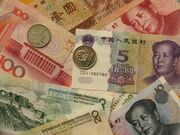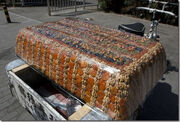
Areas with heavy tourist pedestrian traffic like Nánjīng Dōng Lù (above) provide great opportunities for scammers and pickpockets
While Shanghai is generally an extremely safe city in terms of violent crime, there are certain tricks and scams in operation, mostly around areas commonly frequented by unsuspecting tourists, such as East Nanjing Road (南京东路 - nánjīng dōng lù), People's Square (人民广场 - rénmín guǎngchǎng), or Yu Garden (豫园 - yùyuán). Pickpockets do operate in crowded areas, so it's always a good idea to keep your wallet in a tight pocket to make it harder to lift, and girls should always keep their handbags zipped up. This is also why you'll see plenty of Chinese people walking around with their backpacks on their front.
As for scams, there's a useful thread in /r/china in which redditors have shared some of their experiences of being scammed in China. Generally speaking, it's like anywhere else in the world - if something seems too good to be true, it usually is! Naive-looking foreigners make easy targets as they're generally out of their element and comparatively wealthy marks.
General tips for avoiding scams
Shanghai is a big city and suffers from the same problems as most big cities. While there is less violent crime here than in many big cities in the USA or other western countries, you should still follow the basic rules of thumb for staying in any big city:
- If it seems too good to be true, it probably is. Exercise common sense.
- Broadly speaking, Chinese are a very conservative culture and often need an introduction before they bother someone they don't know. If someone tries to connect with you in the street - no matter how friendly - stop and ask yourself, "why me?"
- Be aware of your surroundings: keep your bag in front of you, and don't keep your wallet in a loose, outside pocket.
- Don't carry all your valuables around with you, or at least do not keep them all in the same bag or pocket.
Common scams
Here is a (non-exhaustive) list of some of the more common scams in Shanghai - generally, scams are best avoided simply by ignoring the scammer and moving on. To a well-honed con artist, even breaking your stride will be seen as an opportunity to lure you in.
The tea ceremony scam

Don't be fooled by invitations to a 'traditional Chinese tea ceremony' - they are all scams
This is a very common scam, and unsuspecting tourists fall victim to it every single day. Generally, it involves somebody approaching you in the street and engaging you in conversation (they may use the excuse of 'wanting to practice their English'), before asking you if you would like to attend a traditional Chinese tea ceremony. If you agree, they'll lead you down several side streets, confusing alleys and underpasses, before bringing you into a room or apartment in a dilapidated building where some old Chinese man or woman will serve you a few different teas (generally of little to no value). Later, you'll be handed an extortionate bill totalling several hundred (or sometimes thousand) RMB. In order to avoid confrontation or insulting their hosts, many people end up paying the bill in full, even though the tea is probably worth a handful of RMB at most.
Idiots like this girl have even fallen for this scam even though they had been expressly warned about it 24 hours beforehand. Don't be that idiot.
Chinese tea is certainly a popular beverage, and there are plenty of tea houses around the city where you can sample many different kinds of tea. However, the truth of the matter is, apart from one that takes place at traditional Chinese weddings (wherein the husband and wife-to-be pour tea for each others' parents as a sign of respect), there's isn't really such a thing as a 'traditional Chinese tea ceremony' - it's more of a Japanese tradition to have tea served in a ceremonial way: this is known in Japan as 茶道 (chadō), or "the art of tea".
The art student exhibition scam
This is very similar to the tea ceremony scam, but will involve an 'art student' approaching you and asking if you want to attend his exhibition. It ends up pretty much the same way: a large bill for items you don't even want, and the fear of insulting your host by not caving to their demands.
The English practice scam
Generally speaking, if a perfect stranger approaches you and claims they want to take you somewhere so they can practise their English, you should refuse and walk away. Many western travellers and tourists are lulled in by a friendly face in the sea of gawking strangers, and the comparative rarity of a Chinese person speaking English well. It's no bad thing to want to make new friends, but be wary of those who would take advantage of your gregarious nature. Once they have your attention and your confidence, there are any number of scams or tricks they can try.
This isn't to say that any English-speaking Chinese person is trying to scam you, of course. But in an area frequented by tourists, if someone seems particularly keen to speak to you and become your friend for no apparent reason, there are probably ulterior motives at play.
The short-change/wrong note scam

Familiarise yourself with Chinese currency to prevent being short-changed
ALWAYS check your change from stores, especially market stalls. It's common to be short-changed, especially if you seem like you're not particularly familiar with Chinese money. Chinese people have also been known to slip notes from other currencies (e.g. Russian roubles) within the change, which can easily be mistaken for Chinese money if you're not paying attention.
The taxi driver 'fake 100 RMB' scam
Try not to pay taxi drivers with 100 RMB notes: either use your transport card, or lower RMB denominations. A common scam is for dishonest taxi drivers to take your legitimate 100 RMB note, subtly exchange it for a fake one and pocket yours. He will then make a show of 'checking' it, before telling you that he can't accept the note because it's a fake, and hand it back to you.
This leaves you with a fake note and a taxi fare still to pay. If you fall for it and hand him another 100 RMB note, the driver might even try it again. Although the majority of cab drivers are on the up-and-up, this is a well-known scam, so if you're stuck in a situation where you can only pay with a 100 RMB note, make sure you're paying attention once you hand it to the driver.
This scam is not just limited to taxi drivers - it has been known to happen in stores or in markets, too.
The taxi driver 'card swipe' scam
Similar to the fake 100 RMB scam, if you pay with your trusty Shanghai Public Transport Card, the driver may pocket your card and give you an empty one back, telling you that there's a problem with your card so you'll have to pay with cash - therefore you're losing out on whatever value is loaded on the card as well as the cash you hand over to cover the fare. This can easily be avoided by personalising your transport card with an easily identifiable sticker or sleeve, so you immediately know that it is yours.
The unofficial taxi scam
Only use official Shanghai taxis. If a car (usually a black car that looks nicer than most usual taxis) pulls up next to you and the driver asks you where you want to go, or simply says "taxi?", you should walk away and find an official cab. These unmetered 'taxis' seek out foreigners and charge outlandish fares, or worse.
The 800Gb USB stick scam

If something seems too good to be true, it usually is - and these USB sticks are no exception
At fake markets around the city you'll often see USB sticks from seemingly reputable brands at capacities way over what you're used to seeing. Unsurprisingly, these 360/500/640/800Gb flash drives are not legit. If you express any kind of doubt to the seller, they will plug it into a computer and show you that Windows says they are in fact as advertised - though this is still a lie, as they have simply been hacked to make it look as though they are that size when you check it on a computer. It's a scam, plain and simple. Do not buy them.
The KTV scam
If some pretty Chinese girls randomly ask if you want to go to KTV (karaoke) or a club, be wary. It could possibly be a scam - it's not totally uncommon for girls to find naive foreigners to go out drinking with them, run up a huge bill and then leave you to foot it. The same goes for girls who ask to come and eat a meal with you - sadly, they are not simply bedazzled by your exotic looks and charm.
Again, these kinds of scams tend to be around popular tourist areas such as People's Square and East Nanjing Road. Generally speaking, any time when you are going to a bar with strangers, you should always pay for drinks as you go. Running up a bar tab with people you don't know can be a dangerous exercise.
The Uyghur nut cake scam

The Uyghur nut cake - looks tempting, but beware of scams
In areas with lots of market stalls, you may find a stall selling what looks to be a huge cake made of fruits and nuts, wrapped in cling film (saran wrap), known in Mandarin as 切糕 (qiē gāo - "cut cake") or 核桃糕 (hétáo gāo - "walnut cake").
First the seller will generally show a price list - for example, showing prices for 1kg, 5kg and 10kg. If a foreigner wants to buy some of the cake, they generally just want a little piece to try it. However, no matter what you ask for, they will always cut off a huge slice. More importantly, the cake itself is very densely packed, meaning that even a thin slice will invariably weigh far more than you'd expect just from looking at it. Thus, what started off as a curious desire to try a new snack quickly becomes a potentially very expensive transaction.
If you then try to explain that you only wanted a little bit to try it, they'll tell you that they've already cut it off and can't put it back, so you have to buy it. At this point you'll be pointed towards the small print on their sign, which has a clause saying that after the cake has been cut, there are strictly no returns. If you do anything but pay at this point, they'll crowd around you along with fellow stall owners and try to intimidate you into paying.
The fake police scam

The China police ID, which is clearly emblazoned with "CHINA POLICE" in both Chinese and English.
This one has recently become more common since scammers decided to capitalise on the 100-day "foreigner crackdown" in 2012. In areas populated with lots of tourists, occasionally people dressed as policemen will ask random foreigners to show them their passport for identification. When the mark isn't able to do so as they don't take their passport with them everywhere they go, they levy a 'penalty fine' (usually around 500 RMB) and threaten the hapless tourist with imprisonment. The simplest way to suss out a fake policeman is to ask to see their police ID - they are obligated to show it to you in order to prove that they're legit.
The flat tyre scam
If you own a bicycle, be careful when parking. Unfortunately, bike theft is fairly common in Shanghai, but there is also a cheeky scam where people who work for bicycle repair shops will slash or let the air out of tyres of bicycles parked nearby. This forces the owner to get it fixed at the nearest repair shop, which just happens to be them. Be very wary of parking your bike near any repair shops.